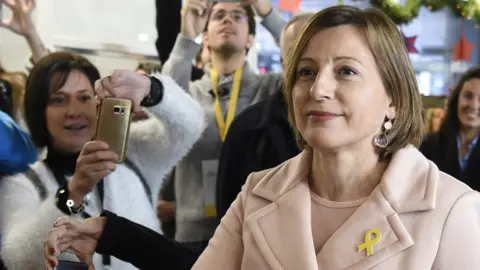Jailed Catalan Speaker Forcadell appeals to European court
 Getty Images
Getty ImagesCarme Forcadell was the speaker of the Catalan parliament until January - but has spent almost nine months in prison.
The 63-year-old was jailed in March, facing charges of rebellion for her part in the 2017 push for Catalan independence.
She spends 15 hours a day alone in her cell. If convicted, she faces up to 17 years in prison.
Now she is calling on the European Court of Human Rights (ECHR) to order her release.
In a rare interview at the Mas d'Enric prison, Ms Forcadell told the BBC that life in her 10 square-metre cell was proving difficult.
"Every day is very hard because you know you are innocent but you don't know how many days and nights you'll stay locked up," she said. "I greatly miss my family and those I love."
"It is especially hard for my mother, who is 90 years old and suffers a lot. Also for my husband and my sons – I want to get out soon for them. When they come to see me, I see the suffering reflected in their eyes."
At home in Sabadell, her husband Bernat Pegueroles is also having a hard time.
"It has broken the family, in a way," he said.
"My sons get on with their lives, but they are suffering too because their mother isn't here. We have a one-year-old grandson and she hasn't seen him growing."
"Now he has started walking, and she is excited when we visit – but the lad doesn't recognise her," he said.
Who is Carme Forcadell?
Ms Forcadell was the speaker of the Barcelona parliament when it voted to declare Catalonia an independent republic on 27 October last year, following a disputed vote in the region a few weeks earlier.
She spent a single night in jail that November before being released on bail – but was sent back to prison in March 2018.
Her legal team are filing a petition with the ECHR in Strasbourg, saying Ms Forcadell's pre-trial detention breaches her human rights.
The trial is expected to begin in Spain in the new year.
What is her case?
Spanish prosecutors allege that Ms Forcadell was part of a conspiracy to achieve independence illegally – specifically, that she allowed parliamentary debates on independence to go ahead despite warnings from Spain's Constitutional Court.
Yet Ms Forcadell insists she did nothing wrong.
"My role as speaker of the parliament cannot be to censor the debate, if there is a parliamentary majority which has been elected in free and democratic elections and which wants to speak about this subject," she said.
"My duty is to defend the sovereignty of parliament, freedom of expression, political pluralism, and the right of initiative of the deputies."
"In a democratic parliament, the word has to be free. One has to be able to speak about everything. The only limit must be respect for fundamental rights," she said.
Eight other Catalan leaders are in jail awaiting trial in connection with the October 2017 push for independence. They are:
- Dolors Bassa, former labour minister
- Jordi Sànchez, former president, Catalan National Assembly
- Oriol Junqueras, former vice-president
- Jordi Cuixart, president of Omnium Cultural
- Jordi Turull, former Catalan government spokesman
- Josep Rull, former territorial minister
- Joaquim Forn, former interior minister
- Raul Romeva, former external relations minister
What does Spain say?
Teresa Cunillera, the Spanish government's delegate in Barcelona, denies there are political prisoners in Catalonia.
Instead, she said "there are some politicians who, in exercising their responsibilities, broke the law".
"So the courts acted, and as a result they are now in the hands of justice," she said.
Spain's Supreme Court held an initial hearing on Tuesday to decide whether it was competent to hear the trial.
Defence lawyers want the case to be tried by a court in Catalonia, but others have faith in the courts in Madrid.
Inés Arrimadas leads the pro-Spain Citizens party in the Barcelona parliament.
"I wish they hadn't done what they did, but they declared independence," she said.
"They approved a rule which went outside the Spanish constitution, they denied our rights, they silenced us as the opposition in the parliament of Catalonia."
"I think that politicians have to answer before the law like any other citizen."
